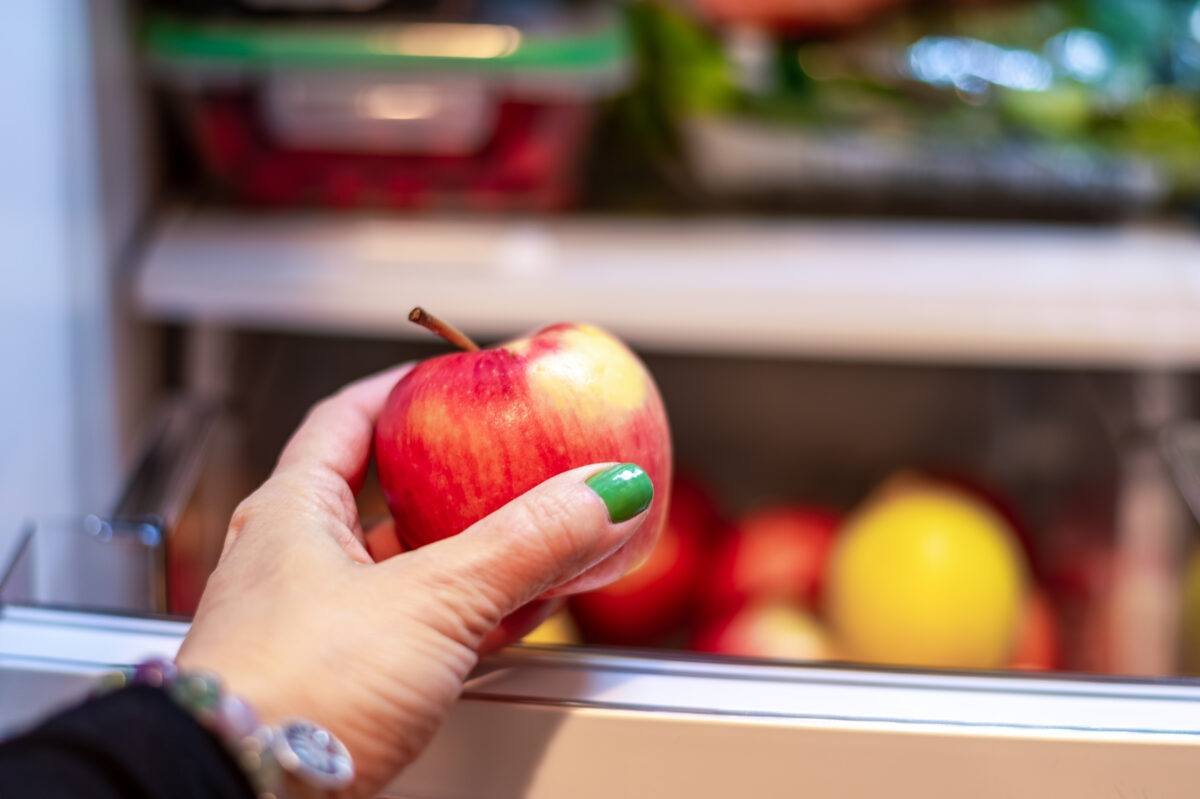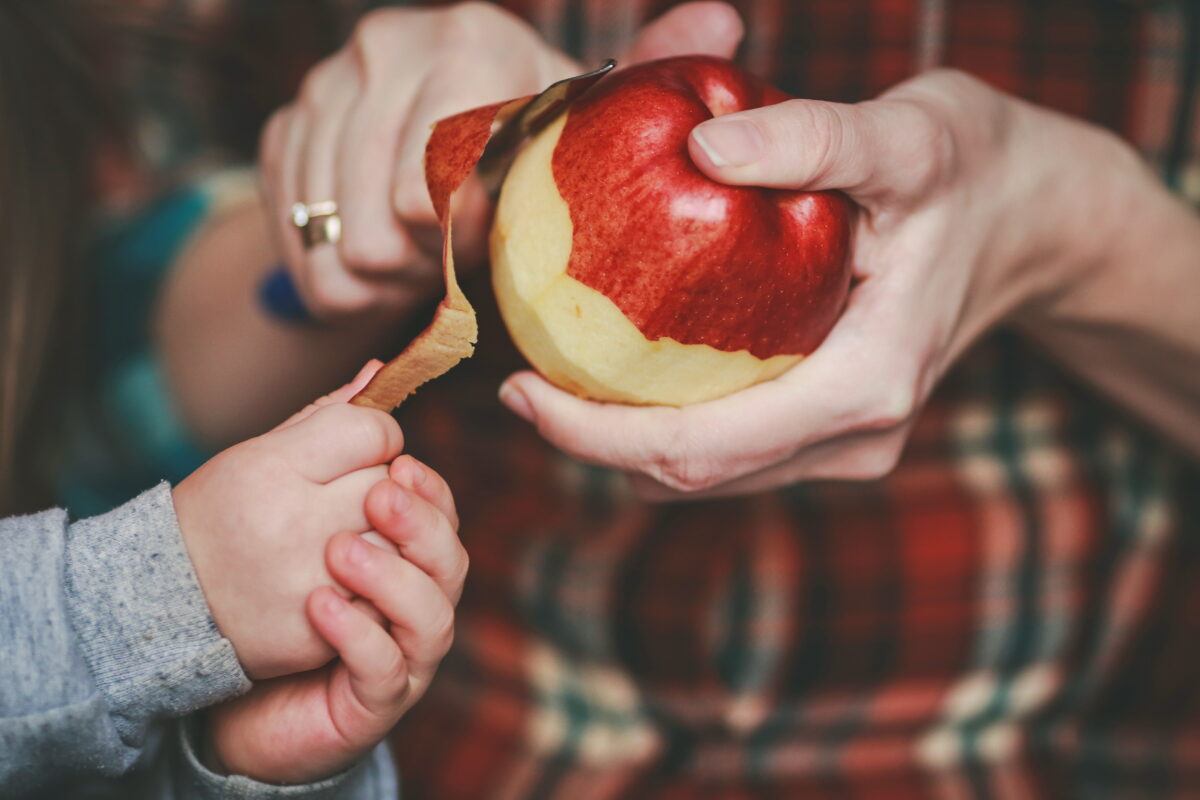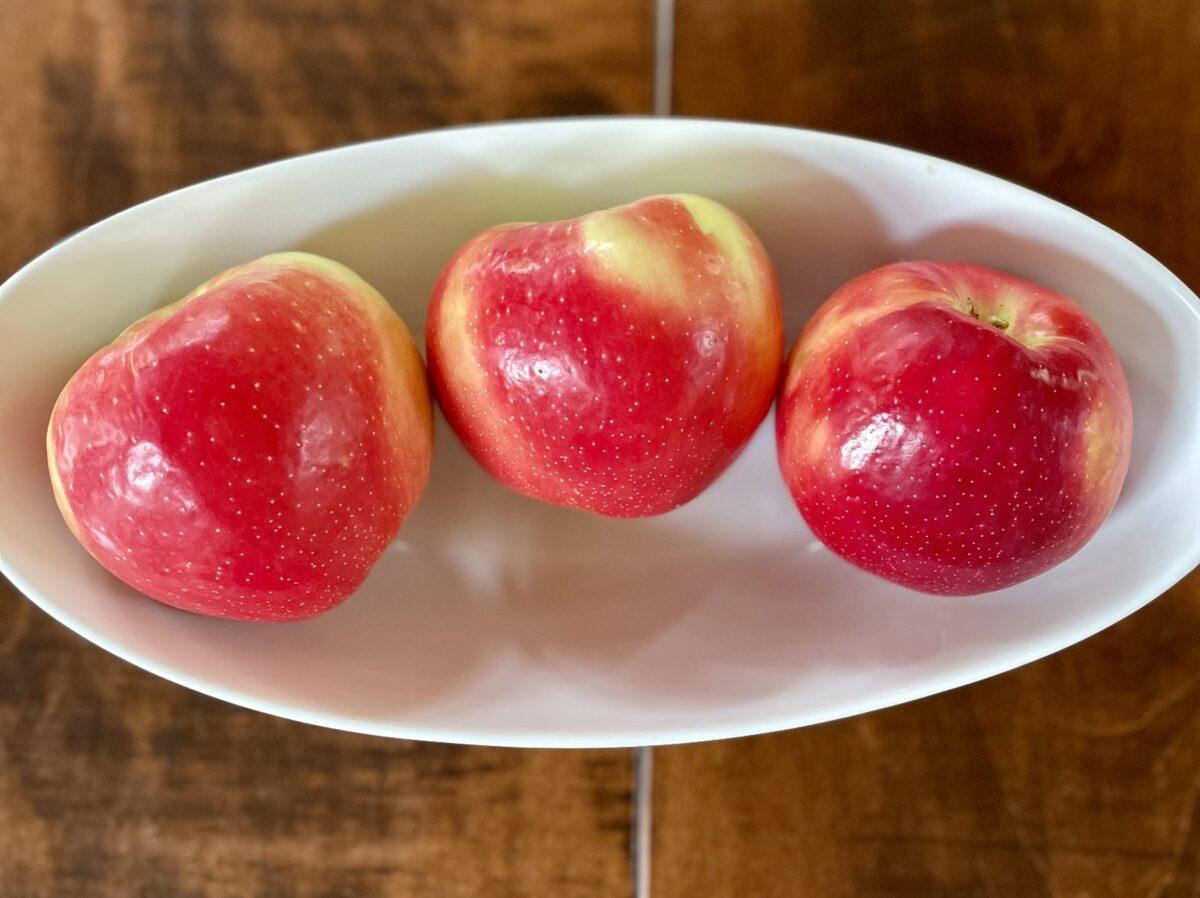Should I put apples in the fridge?

Apples, nature’s crunchy and sweet gift, often find themselves at the center of a culinary problem—should they be nestled in the fridge’s cool embrace or basking in the warmth of the kitchen countertop? The answer to the question, “Should I put apples in the fridge?” is easy. All of my apples are organic, so they go in the refrigerator for reasons I will explain later.
But what about the apples you purchased at the grocery store? I want to unravel the mysteries behind this age-old quandary and equip you with the knowledge to answer this fruity dilemma and proactively care for your apple investment for maximum enjoyment!
The Case for Refrigeration
The porous skin of an apple

The case for refrigeration begins with understanding the skin of an apple. The skin has a porous barrier; it contains microscopic pores that exchange gases, moisture, and other substances with the external environment. These pores play a role in the respiration process of the apple on the tree and off the tree, allowing it to take in oxygen and release carbon dioxide.
The porous nature of the apple skin also makes it susceptible to moisture loss, which can contribute to the dehydration and shriveling of the fruit over time. Additionally, the skin’s permeability allows for the absorption of substances such as pesticides or wax coatings applied during cultivation and post-harvest handling. As organic farmers at Chelan Ranch Organics, we do not use synthetic pesticides or wax coatings such as Apeel to extend our apples’ shelf life.
Understanding the porous nature of apple skin in its unadulterated form is relevant to an apple’s ripening process and shelf life. So, to begin the decision to refrigerate or not, determine if your apples are organic or conventional. Organic apples should go in the refrigerator. All other apples probably have a shiny wax coating that seals the apple’s skin to decrease the aging process and artificially extend the shelf life of the apple. The use of innovative coatings and technologies to extend the shelf life of fresh produce is an evolving field, and changes or expansions continuously evolve. The Food and Drug Administration (FDA) regulates food labeling in the United States. Generally, coatings considered safe and meet FDA standards for food additives may not require specific labeling. Choosing organic fruits and vegetables is the only guaranteed way to avoid these coatings that use synthetic coatings.
Ripening Process

Once harvested, and assuming no coating has been applied, the apple continues ripening, and various physiological and biochemical changes occur, leading to texture, flavor, and nutritional content alterations. The rate of ripening or softening at a given temperature depends on the variety. The ripening process changes the apple in color, softens it, and develops its characteristic flavor profile. A natural plant hormone called ethylene gas plays a significant role in the ripening of apples. Managing the ethylene production when caring for apples post-harvest is a critical consideration.
Organic apples ripen about four times faster at 50° F than 32° F. They become overripe rapidly at 70°F or above. Storing apples in a refrigerator slows ripening, leading to natural withering and decay.
At Chelan Ranch Organics, we hand-pick our apples when they’re at their peak of ripeness to ensure the best flavor, texture, and nutritional quality. That means you can have an optimal eating experience immediately upon receiving your apples from our farm to your door. You can extend this optimal apple-eating experience for months by placing your apples in your refrigerator directly upon receiving them.
Best Storage
The best storage for Chelan Ranch Organics’ apples is 30°F – 32°F with a relative humidity of 90 percent and some air circulation. These conditions provide the most significant delay in the normal ripening process of apples.
- Low temperature, 30°F – 32°F
- High humidity, 90%
- Air circulation
Crisper Drawer
The crisper drawer in the fridge checks all the boxes for best storage because of the additional controlled humidity with air circulation. The controlled humidity feature of the drawer allows you to adjust the humidity level within the compartment while allowing air circulation. Apples benefit from a higher humidity environment to prevent them from losing moisture and becoming dehydrated. The optimal conditions help retain the crisp texture. Since apples have porous skin, they are susceptible to absorbing odors from other foods. The separation from other foods preserves their distinct taste for extended periods.
Small Quantities in Plastic Bags
Small quantities of apples stored in plastic bags are an alternative to the crisper drawer. The bags should have holes or perforations for air circulation to avoid excess moisture build-up and allow ethylene gas exchange. Bags should have ten to twelve ¼” holes to permit ventilation and maintain desirable humidity. Decay will occur if the humidity is too high, especially if the temperature is much above 32 °F.
Storing Cut Apples
If you’ve sliced into the crisp flesh of an apple but can’t finish it in one sitting, fear not. Sprinkle the cut surfaces with a bit of lemon juice to prevent browning, then wrap the slices in plastic wrap or store them in an airtight container in the refrigerator.
The Case for Non-Refrigeration

Conventional apples typically have a wax coating applied post-harvest but will still continue to ripen to some extent. The wax coating, often applied for protective and cosmetic purposes, helps prevent moisture loss, slows aging, and provides a glossy appearance to the fruit. While the wax coating can create a barrier that reduces the exchange of gases (such as oxygen and ethylene), it does not entirely stop the ripening process.
Even with a wax coating, apples can still release and respond to ethylene, leading to color, texture, and flavor changes as they ripen.
The extent of ripening in wax-coated apples can depend on various factors, including the type of wax used, storage conditions, and the apple variety.
In practical terms, consumers may notice changes in the texture and flavor of wax-coated apples over time, especially if stored at room temperature. However, the wax coating can help extend apples’ shelf life and freshness compared to those without a protective coating. Store apples in a cool, humid environment, such as a refrigerator crisper drawer, for optimal quality. A wax coating will provide even more protection against dehydration and external contaminants in the crisper.
Apple Variety
Refrigeration extends the shelf life of all apples. However, some varieties are better at maintaining quality at room temperature than others. Here are a few apple varieties that tend to have a relatively longer life at room temperature:
- Granny Smith:
- Granny Smith apples are known for their firm texture and high acidity, which helps slow browning. They can be stored at room temperature for a reasonable period while maintaining their crispness.
- Fuji:
- Fuji apples have a dense, crisp texture and a good balance of sweetness and tartness. They can stay fresh for an extended period at room temperature, but keeping them in a cool, dark place will help preserve their quality.
- Pink Lady (Cripps Pink):
- Pink Lady apples have a firm texture and a sweet-tart flavor. They are known for holding up well at room temperature, but like other apples, they benefit from a cool and dark storage environment.
Room Temperature
At room temperature, the flavors of an apple may be more pronounced. The natural sugars and aromas can be more noticeable, offering a fuller taste experience. Some people find the texture softer at room temperature, and the apple may have a more intense and aromatic flavor profile. I like my apple at lunch to be room temperature, so I remove it from the refrigerator in the morning – an Agrarian Angel hack!
Choose Organic and Choose the Fridge!
Should you put apples in the fridge? The answer is a nuanced one. Personal preference, apple variety, and the desired taste experience play a role. If you purchase our organic apples at Chelan Ranch, we recommend you opt for the cool embrace of the fridge. If you buy conventional apples at the grocery with a wax coating, you may opt for the warm welcome of the countertop. The important thing is to savor the crisp, juicy goodness that this versatile fruit brings to your table. The apple refrigeration dilemma, it turns out, is as diverse as the array of apples themselves—best enjoyed with a touch of personal flavor.